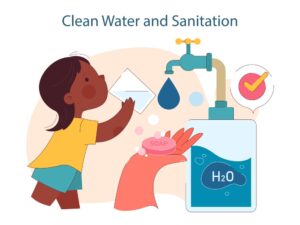Clean Water and Sanitation: A Necessity for a Healthy World
Clean Water and Sanitation: A Necessity for a Healthy World

Introduction
Access to clean water and proper sanitation is essential for a healthy and dignified life. Safe drinking water, hygiene, and sanitation prevent diseases, improve well-being, and promote social and economic development. Recognizing its importance, the United Nations has included Clean Water and Sanitation as the sixth Sustainable Development Goal (SDG), aiming to ensure clean water and sanitation for all by 2030. Despite progress, millions of people worldwide still lack access to these basic necessities.
Importance of Clean Water and Sanitation
Prevents Diseases – Clean water and proper sanitation help prevent deadly diseases such as cholera, diarrhea, and typhoid.
Improves Public Health – Access to safe water reduces child mortality rates and improves overall health.
Enhances Education – Proper sanitation in schools ensures that children, especially girls, can attend classes regularly.
Boosts Economic Development – Availability of clean water helps businesses, agriculture, and industries thrive.
Ensures Environmental Sustainability – Proper wastewater management prevents pollution and protects natural ecosystems.
Challenges to Clean Water and Sanitation
Despite efforts to improve access, several challenges remain:
Water Scarcity – Many regions suffer from water shortages due to climate change, overuse, and pollution.
Poor Infrastructure – Lack of proper water supply and sewage systems limits access to clean water.
Contaminated Water Sources – Pollution from industries, agriculture, and waste disposal makes water unsafe for consumption.
Lack of Awareness – In some areas, people are unaware of hygiene practices and the importance of sanitation.
Financial Constraints – Many developing nations lack the funds to improve water and sanitation facilities.
Solutions to Ensure Clean Water and Sanitation for All
Investing in Water Infrastructure – Governments and organizations should build better water supply and sanitation systems.
Promoting Water Conservation – Encouraging responsible water use can help reduce scarcity.
Improving Waste Management – Proper disposal and treatment of waste prevent water contamination.
Providing Affordable Sanitation Solutions – Ensuring that all communities have access to toilets and clean facilities.
Educating Communities – Awareness programs can teach people the importance of hygiene and safe water practices.
Implementing Strong Policies – Governments must enforce laws to protect water sources from pollution and overuse.
Conclusion
Access to Clean Water and Sanitation is a fundamental human right that must be prioritized. Safe drinking water and hygiene facilities not only prevent diseases but also promote social and economic progress. By working together, governments, organizations, and individuals can ensure a future where everyone has access to these basic but essential resources. A world with clean water is a world with better health, education, and prosperity.
Our Founder Mr Vivek Gupta social presence
Blog : http://vivekgupta1977.blogspot.com/Twitter: https://twitter.com/vivekgupta1977
Facebook: https://www.facebook.com/vivekgupta1977
Linkedin: http://in.linkedin.com/in/vivekgupta1977
Instagram: https://www.instagram.com/vivekgupta1977
Youtube: https://www.youtube.com/user/vivekgupta1977